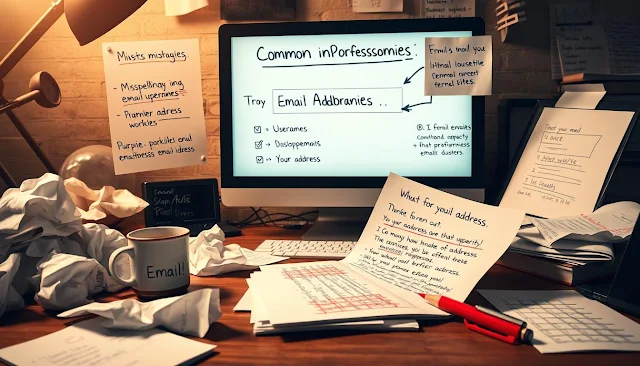Professional Email Address: Are you a business owner that uses Gmail email?

A professional email address is a key part of your company’s image and reputation. It shapes the first impression people have of you, whether you’re communicating with clients or partners. This foundation builds professionalism and trust. Recipients are more likely to respond to emails from recognized domains than from generic domains like Gmail or Yahoo. A professional email address boosts security and ensures your important emails reach the right place. Plus, a professional email signature strengthens your brand identity and provides essential contact information, making it easier for recipients to connect with you. This attention to detail shows your commitment to quality and professionalism in all communications.

Creating a professional email account is not just a placeholder; it shows both skill and trustworthiness. To build credibility, start by understanding the traits of a professional email. One key feature is using a custom domain. Using your company’s domain, like firstname@yourcompany.com, increases your brand’s credibility and familiarity. A professional email should avoid numbers, nicknames, or personal references that can harm a formal image. Consistency in communication style, including proper grammar and punctuation, also adds to the professionalism of your emails.

Keep it simple. Use formats that are simple to understand and remember, like john.doe@yourcompany.com. Stay away from complicated formats. When you use straightforward components, your email is simple to recognize and trust. Trust is important in professional communication, and a clear structure helps build that trust. By following these guidelines, your emails will not only convey your message effectively but also reflect a polished and professional image.
There are different formats for professional email addresses that can work well. Starting with your last name: John.doe@company.com is a beneficial choice for individual recognition. You can also use your initials and last name, like J.doe@company.com, for more privacy or space. At times, it can be beneficial to identify your role within the organization. Emails like support@company.com or info@company.com stand out because they are clear and easy to use. These role-specific email addresses promote professionalism and improve communication. They help recipients quickly identify the purpose of the email, leading to more efficient information exchange.

Why is having a professional email address important? It’s more than just a way to communicate. A custom domain makes a stronger statement about your brand and can significantly impact how you operate. Building trust and credibility is essential, as it acts like a digital business card when you send a professional email. An email ending with your organization’s name, like contact@company.com, instantly conveys professionalism. Each email strengthens your brand, building familiarity and trust. This consistent branding boosts recognition and assures recipients that they are dealing with a legitimate entity. Using a custom domain can improve communication and strengthen ties with clients and partners.
Enhancing communication opportunities is also key. A professional email upholds your brand, facilitates recognition and memory, and lessens the likelihood of spam flagging. Conversations that start professionally often lead to strong business relationships, which provide a solid base for future interactions. These exchanges build trust and credibility, both essential for any successful business relationship. Investing in a professional email presence not only enhances your brand image but also creates opportunities for valuable connections that foster growth and collaboration.
Using a professional email address boosts both delivery and security. Professional domains lower the risk of spam flags, improving the chances of your emails reaching their intended recipients. Many professional services offer strong security measures to protect you and your customers from dangers. Effective filtering of professional emails helps prevent the loss of important messages and blocks unwanted ones. Plus, using a professional email signature can reinforce your brand identity and credibility. Including key contact information and links to your website or social media makes it simple for recipients to engage with your business.

A professional email is vital for building trust with clients and peers, as it forms a key part of your company’s identity. To set up a professional email, follow these steps: 1. Choose a suitable domain name: Your domain should match your brand and be simple to remember. People forget complex or long names. 2. Pick a domain that stands out and reflects your company’s values. 3. Choose an email hosting service: Find a provider that offers features to boost functionality and security. Google Workspace is popular for small and medium-sized businesses due to its simple integration with Google tools. Microsoft 365 is beneficial for companies that use Microsoft products, while Zoho Mail is affordable and user-friendly. Fastmail is excellent for those who prioritize privacy and offers strong spam filters. 4. Format your emails: Pay attention to the layout to maintain a professional look. Use clear subject lines, a friendly greeting, organized content, and a standard signature. 5. Avoid common errors: Mistakes in choosing and using a professional email address can hurt your credibility. Don’t use unprofessional usernames like “partyprincess89” or “crazydancer.” Instead, use a format that includes your name or initials, like “jane.smith@company.com,” to keep a professional image.

In conclusion, creating a professional email is essential for building trust and maintaining credibility in your company. By following these steps, you can craft a professional email that stands out and effectively represents your company’s values. Email signatures play an important role in a professional email, serving as a condensed form of self-promotion and boosting your brand’s credibility. Including your name, position, contact info, and links to social media in your email signature can improve your image and ensure recipients get the information they need. Also, adding a logo or tagline that captures your company’s mission can further strengthen your brand identity. A well-designed email signature not only provides vital details but also leaves a lasting impression, encouraging recipients to engage with your business.
Don’t ignore security when setting up an email account; it risks your data and reputation. Use strong security measures like encryption, two-factor authentication, and strong passwords to protect your information. A professional email address enhances your company’s reputation and improves how people perceive your brand. Engaging your audience through a secure email system builds trust and encourages ongoing communication. A strong email presence can enhance customer loyalty and drive growth for your business.
Key aspects of using a professional email include making a favorable first impression, maintaining brand consistency, and establishing trust. A professional domain improves deliverability, reduces spam, and boosts security. Simple email formats enhance efficiency by making it easier for recipients to remember your messages. Engaging subject lines and clear calls to action can improve response rates. By focusing on these elements, businesses can foster meaningful interactions with their audience, leading to stronger relationships and increased conversions over time.

A professional email address shows your commitment to professionalism and can greatly affect how customers and business partners view your brand. It’s important to evaluate your email presence to ensure it reflects your identity and values. If not, consider updating your email to align with your branding and values, which can help build trust and credibility. Investing in a professional email setup creates a more cohesive and trustworthy communication channel that connects with your audience.
Sending consistent, professional emails can streamline communication and make interactions easier and more productive, whether you’re sending a simple question, proposal, or follow-up. Remember, your email should be more than just a communication tool; it should also serve as a powerful way to build lasting relationships. Reevaluating and improving your email is a simple but important way to enhance your professional image. By refining your writing style, you not only clarify your message but also show respect for your recipient’s time. This attention to detail can lead to more fruitful exchanges and opportunities in your career.
In summary, a professional email address is crucial for a company’s reputation and communication with potential customers and partners. By focusing on these elements, you can create a polished, professional email that sets the tone for future interactions and builds trust with your audience. A professional email address is more than just a detail; it lays the groundwork for establishing your company’s reputation and enabling effective communication with potential customers. By adopting a polished format, you show respect for recipients, leading to a better impression. This focus on detail fosters a professional tone in future interactions and helps build trust. Ultimately, investing in a professional email address is an important step toward enhancing credibility and nurturing lasting relationships in business.